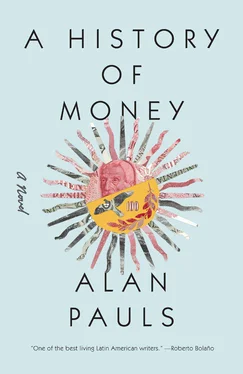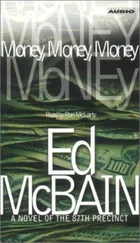She admits as much herself when she tells him that in her dreams about having money — which she has more and more frequently, and not only at night, while she sleeps in the spartan setting she’s chosen for herself in an attempt to, as she says, take the bull of money by its horns, but also during the narcoleptic episodes she succumbs to at all hours of the day, on the bus or in the rheumatologist’s waiting room, sometimes even while she’s translating, in between two intractable paragraphs — there’s only one thing that can definitively ruin the dream, much more effectively, even, than knowing that she’s sleeping (another frequent occurrence): the certainty that any amount of money would be too little, far too little for her aspirations, too little to fill the hole that need has opened in her chest over the years. My thirst for revenge has grown too strong. A reserve would be an option if it were possible to turn back the clock and start again from zero. But his mother doesn’t have zero in her. There’s always some prior balance that grows a little every day, silently and ceaselessly and out of all proportion — minus five, minus twenty, minus a thousand — which any reserve would have to redress. But what kind of perverse reserve would deny the future — by definition the only thing it should be concerned with — because it’s obliged to settle the debt of the past?
She dreams about money, often about just seeing or touching it. When she returns from these dreams, she always feels a vague ache, as though she’s been grazed by the wing of one of the lascivious monsters that poke their snouts between curtains and prowl around sleeping women in paintings. Even when she’s engrossed in her work, totally absorbed by whatever she’s doing, deep in the state of repetitive anesthesia to which her daily life has long been reduced, it only takes one unexpected sign — the shriek of the buzzer or the phone, both of which, to her bullheaded pride, ring ever less frequently within the four walls of her house, and even then generally only to announce an irritation like the knife sharpener, a traveling salesman, a couple of preachers, or a telemarketer — to jolt her from her stupor, startle her awake, and have her standing in front of her bedroom mirror, quickly preening herself and putting on something different, a silk scarf or the only hoop earrings she hasn’t sold, the enormous black glasses that make her look like a grasshopper, anything that will create the right impression for the lawyer or notary she supposes has come to see the mysterious beneficiary of the concession, the donation, the legacy that some dead man or woman has entrusted them in their dying wish to pass on.
As soon as she finds out that someone from the past is looking for her, she forces her memory into action; she spends a whole afternoon cleaning the cobwebs from that storehouse full of useless junk and doesn’t give up until she recognizes the person’s name, can picture their face, and finally, lost in the folds of a school-day morning, a birthday, or a scene from a childhood vacation, finds the secret favor, the mark of complicity, the support she once offered disinterestedly, simply out of friendship, for which the recipient of her generosity has now come to repay her, sixty years later. Peeping into her own childhood, her youth, she notices that everything is slightly different: there’s the same theater of torment, the same darkness, the same damp cold that soaks her to the bone, but while she drags her feet like an anguished soul, without anybody seeing, sometimes without even being aware of it herself, her little frozen hands drop a few seeds like secret messages to posterity.
Suddenly, a small court of new friends springs up around her. They circle her with a languid intensity, like the old moths they are, and die out quickly, in the time it takes for her crazy hopes of inheriting something from them to vanish. She introduces him to one old misanthrope who’s as shrunken as a raisin and very elegantly dressed, with whom she says she shares a Sunday-morning ritual of reading the papers in a bar. That and Verdi’s Luisa Miller are the only things they have in common. He is irascible, vain, rude. He’s never bought her a coffee. He won’t give up a single supplement — not even the women’s one — until he’s finished reading the whole paper. But he’s all alone, and very sick, he probably won’t make it through the winter, and it would be unforgivable to let his box at Teatro Colón, his car and driver, and his weekend place in Colonia be orphaned. When he asks her what it is that she likes about these circumstantial relationships (he knows her, and he’s grown tired of seeing her ill-temperedly reject every stranger that approaches her), she cites either intimate reasons — she likes to be able to talk to a man, for example — or bluntly selfish ones: she wants to take this trip; she needs the air, the thermal baths, the quiet. She won’t be able to finish the translation that’s been giving her so much trouble anywhere but at this Trappist retreat in Córdoba, but when she gets back after a two-week vow of silence and military discipline, dying of hunger and not a single line further in her work, she soon sets about flaying the depressive lesbian she really went to accompany, who drove her crazy talking about her millions and her travels, but realized when she went to pay for their stays at the monastery, as promised, that she had forgotten her wallet. She’s always the one who finds a new bar, stops saying hello to them, and loses their phone numbers, once she’s sick of everything she has to put up with in order to spend time around them, and disgusted with herself, with the absurdity of her own aspirations. She emerges feeling sad and gloomy, as though hungover, but she chronicles her misadventures with a humor, an attention to detail, and a cruelty he would never have imagined in her.
More than once she calls for help and asks him to meet her in the middle of one of her broke girls’ get-togethers, as she calls the gatherings full of nostalgia, cake, gin, and free-flowing gossip that she enjoys with half a dozen fellow travelers at an old-fashioned café in the basement of the oldest, most antiquated mall in the city, whose perfunctory music — bossa nova, Henry Mancini — she professes to love, along with the brothel-worthy insouciance with which the waiters’ jackets and pants — modeled on bellboys from old hotels, in red with black buttons and black with vertical red stripes down the sides — accentuate the muscles in their backs and buttocks. More often than not, he shows up to find them talking about money, in sentences that, more often than not, start, “When I had money …” The rest of the time, for variety’s sake, it’s “When you had money …” His mother always sits in the same spot, facing the door that leads to the street. This way she can see him arrive and get up in time to cut him off before he comes too close, and the rescue can be executed out of sight of the other women (who, of course, start discussing it immediately).
As time passes, she grows impatient, as though something were beginning to drain away from her. It’s a tyrannical impatience that predates her requests, making them angry and as abrupt as orders. It’s no longer enough for him to say that he’ll get the money to her. She feels as though she’s being treated like a child, like rather than helping her he’s simply trying to distract her and soothe her anxiety, as though needing money were nothing but the façade of some greater problem that’s at once deeper and more vague and can be relieved only with kind words rather than money. She wants to know when, where, how. Any distance between the request and its satisfaction is too great. Things could get in the way, anything could happen. He could have an accident, she could have a heart attack, the economy could collapse, the peso crash, all in the space of one night, and the cash would never reach her. She needs it now, immediately. And anyway, she won’t be able to sleep, and then she’ll feel groggy and won’t be able to work (she translates on average three thousand words a day, which means that losing a day of work means losing three hundred pesos) or even get dressed, and she’ll end up going back to bed, exhausted, not to sleep, because she knows there’s nothing more elusive than lost sleep, but to lie there on her back with her eyes wide open, asking herself the same question she always asks: How long will she wait this time before taking the pills that will knock her out?
Читать дальше












